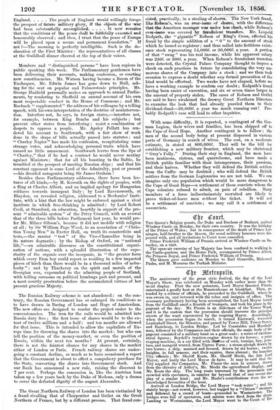Members and " distinguished persons " have been copious in
public speaking this week. The Parliamentary gentlemen have been delivering their accounts, making confession, or courting new constituencies. Mr. Watson having become a Baron of the Exchequer, Mr. Edwin James has gone down to Hull, ask- ing for the seat on popular and Palmerstonic principles. Mr. George Hadfield personally makes an approach to annual Parlia- ments, by rendering to Sheffield an annual account of his own most respectable conduct in the House of Commons ; and Mr. Roebuck " supplemented " the address of his colleague by a telling speech, with his own interpretation of the doctrine of noninterven- tion. Interfere not, he says, in foreign states,—interfere not, for example, between King Bomba and his subjects ; but prevent other states from interfering ; resist a combination of despots to oppress a people. Mr. Apsley Pellatt has ren- dered his account to Southwark, with a fair show of work done in the shape of bills actually passed into statutes ; and " Charley Napier" has made his confession, recapitulating some strange votes, and acknowledging personal traits which have caused no little amusement. Southwark learns from the lips of " Charley," that if he had a contract he would never mutiny against Ministers ; that for all his boasting in the Baltic, he trembled at the prospect of meeting Russian ships ; and that his constant opponent is some Lord of the Admiralty, past or present —his dreaded antagonist being Sir James Graham !
Besides these Parliamentary addresses, there have been lec- tures of all kinds,—by M. Kossuth on the rights of peoples, with a fling at Charles Albert, and an implied apology for Hungarian coldness towards insurgent Italy ; by Lord Ravensworth, at Blaydon, on revealed religion, addressed to a Mechanics' Insti- tute, with a hint that the law might be enforced against a rival institute in which free-thinking is admitted ; by Lord Robert Cecil, at Stamford, on education, heartily in support of the pre- sent " admirable system " of the Privy Council, with an avowal that of the three bills before Parliament last year, he would pre- fer Mr. Milner Gibson's, because it did not meddle with religion at all ; by Sir William Page Wood, to an association of " Chris- tian Young Men " in Exeter Hall, on truth its counterfeits and tests,—the master " test" of the Vice-Chancellor being in its nature dogmatic ; by the Bishop of Oxford, on " national life,"—an admirable discourse on the constitutional organi- zation of nations, with a splendid illustration of the supe- riority of the organic over the inorganic, in " the greater force which every Eton boy could report as residing in a few impacted pieces of birch than there would be in a thousand miles of nebu- losity " ; and by Thackeray on the spirit and morals of the Georgian sera, expounded to the admiring people of Scotland, with telling sarcasms on political humbugs past and present, and a most courtly prostration before the accumulated virtues of her present gracious Majesty.


























 Previous page
Previous page